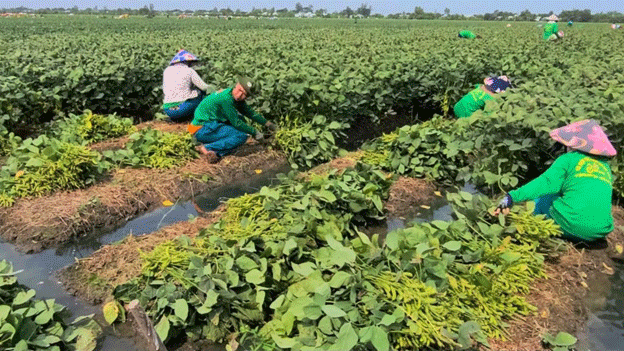The ongoing partnership between An Giang-based company Antesco and local farmers in the province has significantly boosted the production and consumption of vegetable soybeans (edamame), yielding impressive economic outcomes. Over the past two years (2023–2024), the collaborative efforts between Antesco and the People’s Committee of Phú Tân District have resulted in a strengthened production value chain for vegetable crops. This partnership has not only increased production but also improved soil quality and boosted farmers’ income through sustainable farming practices.
Nguyễn An Nhàn, Director of the Crop Procurement Department at Antesco, highlighted the results of this collaborative initiative, where farmers in Phú Tân District were linked through cooperatives (HTX) and production teams (THT). In 2023, the production area achieved 87.6% of the planned 244.5 hectares, with vegetable soybeans covering 84.4% of the land and yielding 88.9% of the expected output. Sweet corn production also exceeded expectations, with 131% of the planned area under cultivation. The total harvested output reached nearly 2,680 tons, including 2,369.5 tons of vegetable soybeans and 310 tons of sweet corn, with 100% of the harvest purchased by Antesco for processing and export.
From 2023 to 2024, vegetable soybean production expanded from 99.3 hectares across seven communes to 219.5 hectares in ten communes, with the total harvested yield increasing from 963 tons to 2,369 tons. The average yield per hectare also rose from 9.7 tons in 2023 to 11.7 tons in 2024. This expansion has improved soil fertility and increased the production value of agricultural land, with higher profit margins compared to rice cultivation.
Nguyễn Thanh Tuyến, Head of the Phú Tân Agriculture and Rural Development Office, emphasized that the shift toward vegetable soybean production has transformed local agricultural practices. The transition from chemical-intensive farming to organic methods has reduced the need for chemical fertilizers by incorporating 40% organic inputs alongside 60% chemical fertilizers. This practice not only enhances soil fertility but also decreases pest and disease incidence, contributing to higher yields and lower production costs. Consequently, farmers are gradually shifting from conventional chemical farming to more sustainable, organic agricultural practices.
For the 2024–2025 winter-spring season, Antesco plans to continue its partnership with Phú Tân District farmers, targeting a production area of 250 hectares for vegetable soybeans. The company also intends to expand its international market through trade fairs and global events, ensuring consistent demand for its soybean products. To mitigate risks such as cross-contamination of crops, Antesco has proposed establishing centralized production zones, along with financial support for farmers to cover production costs.
Farmer Nguyễn Minh Cảnh from Phú Xuân Commune reported that the cooperative successfully implemented organic fertilizers in the winter-spring season, increasing soybean yields to 13–15 tons per hectare. The harvest met the company’s stringent quality standards, ensuring clean, export-ready crops. He added that with adequate irrigation infrastructure and access to credit, the cooperative could potentially expand soybean cultivation to 70–100 hectares in the next season.
Soybean farmers like Nguyễn Văn Lâm, who expanded his farm from 1 to 8 hectares since 2016, expressed confidence in the partnership with Antesco. He noted that during the 2023 winter-spring season, the vegetable soybean yield reached 1.6 tons per 1,000 square meters, with profits ranging from 7 to 8 million VND per hectare in just 68 days of cultivation. Sweet corn, with the same growing period, provided additional profits of up to 8 million VND per hectare.
The collaboration between Antesco and local farmers in An Giang has demonstrated the benefits of sustainable agricultural practices, including higher yields, improved soil quality, and increased profitability. The partnership’s success is a model for future agricultural development in the region, especially as the demand for clean, organic produce continues to rise. By fostering strong market linkages and providing support to farmers, this initiative has secured a stable market for vegetable soybeans, ensuring long-term economic benefits for both farmers and the company.
Error




